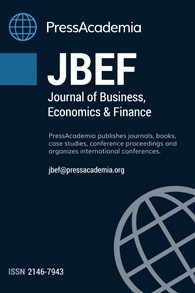Trade Liberalization and Economic Growth In Nigeria; A Cointegration Analysis
Trade Liberalization and Economic Growth In Nigeria; A Cointegration Analysis
___
- Ayorinde, F. and Olayinka, O. (2002). Trade Liberalization and Technology Acquisition in the Manufacturing Sector: Evidence from Nigeria. AERC Research Paper, No. 117, August.
- Chaudhry, I.S., Malik, A. and Faridi, M.Z. (2010). Exploring the Causality Relationship Between Trade Liberalization, Human Capital and Economic Growth: Empirical Evidence from Pakistan. Journal of Economics and International Finance, 2(8): 175-182.
- Dollar, D. and Kraay, A. (2001).Trade, Growth and Poverty.World Bank Development Research Group. Washington D.C.
- Ebrill, L., Stotsky, J. and Gropp, R. (1999).Revenue Implication of Trade Liberalization.IMF Occasional Paper 180 IMF Washington D.C.
- Effiom, L., Ubi, P.S., Okon, E.O. and Itam, E.E. (2011). Trade Liberalization and Human Capital in Nigeria: A Vector Autoregressive Analysis. European Journal of Economics, Finance and Administrative Sciences, (40): 154-168.
- Ersoy, I. and Deniz, P. (2011). Financial and Trade openness: Evidence on Emerging Market Regional Groups. European Journal of Economics, Finance and Administrative Sciences, (39): 71
- Frankel, J.A. and Romer, D. (1999). Does Trade Cause Growth? The American Economic Review, 89(3): 379-399.
- Krugman, P.R. (1990). Rethinking International Trade. Massachusetts: The MIT press.
- Manni, U.H.; and Afzal M.N.I. (2012). Effect of Trade Liberalization on Economic Growth of Developing Countries: A Case of Bangladesh Economy. Journal of Business, Economics and Finance, 1(2): 37-44.
- Nwafor, M.C., Adenikinju, A.F. and Ogujiuba, K.K. (2007). The Impact of Trade Liberalization on Poverty in Nigeria: Dynamic Simulations in CGE Model. Poverty and Economic Policy Research Network Working Paper, No.MPIA-2007-16.
- Nwosa, P.I., Saibu, M.O. and Fakunle, O.O. (2012).The Effect of Trade Liberalization on Trade Tax Revenue in Nigeria.African Economic and Business Review, 10(2): 28-43.
- Sakyi, D. (2011). Trade Openness, Foreign Aid and Economic Growth in Post Liberalization Ghana: An Application of ARDL Bounds test. Journal of Economics and International Finance, 3(3):146-156.
- Thirlwall, A.P. (2000). Trade Liberalization and Economic Growth: Theory and Evidence. African Development Bank Economic Research Paper, No 63.
- Yayın Aralığı: Yılda 4 Sayı
- Başlangıç: 2012
- Yayıncı: PressAcademia
Mehmet MUCUK, M. Tahir DEMİRSEL
Empirical Analysis Of The Savings-Growth Nexus In Turkey
Fatma ZEREN, Yusuf Ekrem AKBAS
Trade Liberalization and Economic Growth In Nigeria; A Cointegration Analysis
Felix Gbenga OLAİFA, Kolawole SUBAİR, Musa İlias BİALA
The Twin Deficits Phenomenon In Turkey: An Empirical Investigation
